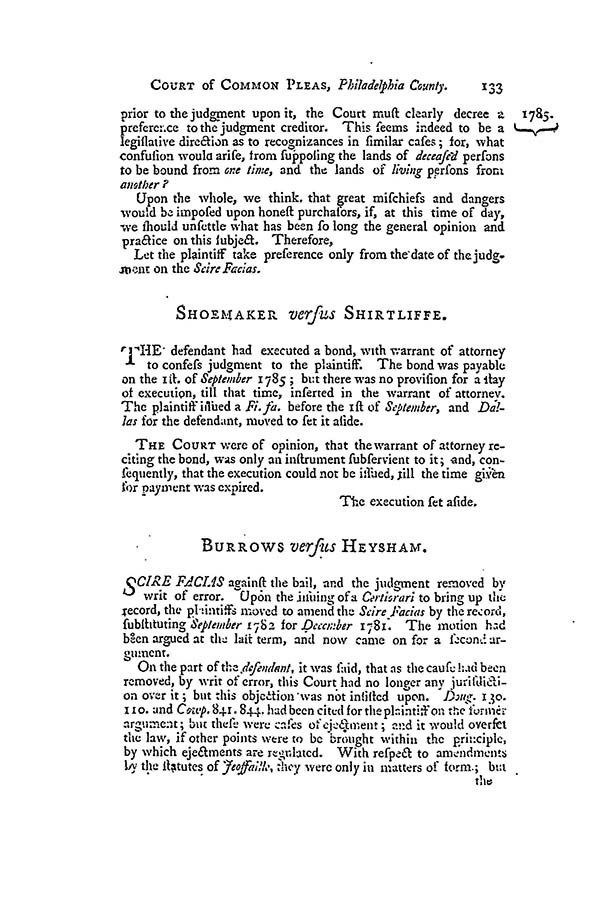Shoemaker v. Shirtliffe, 1 Dall. 131 (C. P. Phila. Cty. 1785) and Burrows v. Heysham, 1 Dall. 131 (C. P. Phila. Cty. 1785)
Shoemaker versus Shirtliffe.
The defendant had executed a bond, with warrant of attorney to confess judgment to the plaintiff. The bond was payable on the 1st of September 1785; but there was no provision for a stay of execution, till that time, inserted in the warrant of attorney. The plaintiff issued a Fi. fa. before the 1st of September, and Dallas for the defendant, moved to set it aside.
The Court were opinion, that the warrant of attorney reciting the bond, was only an instrument subservient to it; and consequently, that the execution could not be issued, til the time given for payment was expired.
Citation: Shoemaker v. Shirtliffe, 1 Dall. 133, 1 U.S. 133 (C. P. Phila. Cty. 1785)
Burrows versus Heysham.
Scire facias against the bail, and the judgment removed by writ of error. Upon the issuing of a Certiorari to bring up the record, the plaintiffs moved to amend the Scire Facias by the record, substituting September 1782 for December 1781. The motion had been argued at the last term, and now came on for a second argument.
On the part of the defendant, it was said, that as the cause had been removed, by the writ of error, this Court had no longer any jurisdiction over it; but this objection was not insisted upon. Doug. 130. 110. and Cowp. 841. 844. had been cited for the plaintiff on the former argument; but these were cases of ejectment; and it would overset the law, if other points were to be brought within the principle, by which ejectments are regulated. With respect to amendments by the statutes of Feoffaille, they were only in matters of form; but 1 U.S. 133, 134 the present motion went to matter of substance, and, therefore, ought not to be granted. The bail, it the judgment is misrecited in the Scire Fracias, is intitled to the relief by writ of error, Salk. 52. L. Ray. 1057. S. C. 6. Mod. 263. 2 Stra. 1165. Gilb. 136.
For the plaintiff it was answered, that, independent of the statutes of Feoffailles, this might be amended. It is a rule at common law to amend, whenever there is anything to amend by. 5 Barr. 1730, was matter of substance, yet amended; because there the rest of the pleadings rectified the error. That, likewise, was a case after a writ, which recites the judgment to have been prior to the date of the recognizance; and in this point it is distinguishable from Salk. 52. L. Raym. 1057.
On the 20th of August, the President delivered the opinion of the Court.
Shippen, President. As it has not been made any part of the argument, that the power of the Court to amend, is not the same, as it was before the action was removed, we shall determine the question as we should have done, if the writ of error had not been brought. Upon the liberal principles of modern practice, therefore, and indeed, for the honour of common sense, we think it incumbent upon us to direct the Scire Facias to be amended by the record. Besides the cases in the books (particularly that in Barnes 6 Sweetland vs Beezely) there are some instances in our own Courts that authorize this determination. I remember in Scott vs Gatbraith at Nisi Prius, in Lancaster, a verdict was given for the plaintiff in ejectment, for one half of the premifes, and nothing was said respecting the other half. A motion was made in Bank to set aside this verdict; but it was allowed to be amended, by adding, "and for the residue they find for the defendant;" although, in that cafe, there was not anything to amend by, but merely what was implied in the verdict.
The rule made absolute.
Citation: Burrows v. Heysham, 1 Dall. 133, 1 U.S. 133 (C. P. Phila. Cty. 1785)


Last modified: October 9, 2013